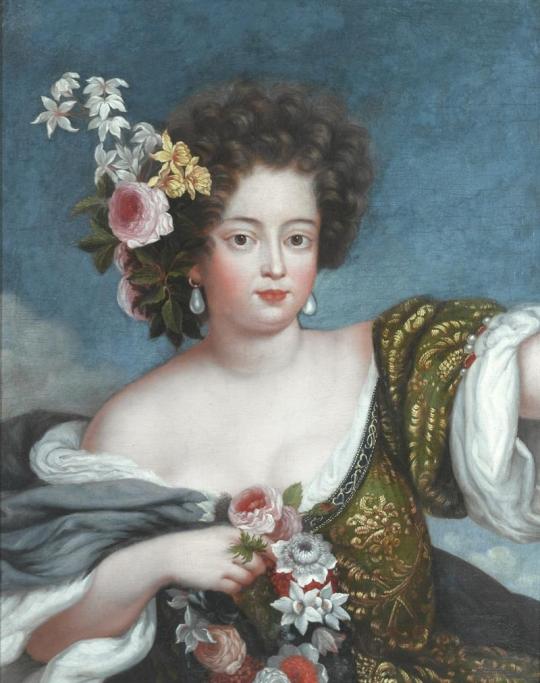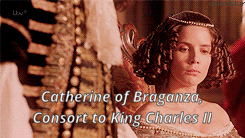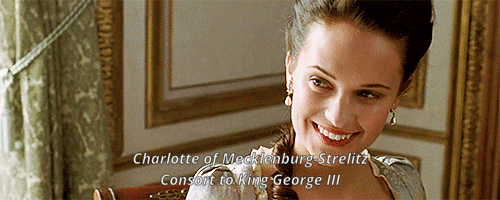#sophia dorothea of hanover
Explore tagged Tumblr posts
Text
Ill-Fated, Scandalous Lovers: Sophia Dorothea and the Swedish Count
The tale of Sophia Dorothea of Celle and her handsome, dashing lover, the Swedish Count Philip Christoph von Königsmarck, is tragic, but also rather foolish, because the lovers were so reckless that they brought about their own doom. It almost seems to me that the heedless teens Romeo and Juliet went about their wooing with more dignity and more sober awareness of the threats they faced than…

View On WordPress
#British History#Count Philip Christoph von Königsmarck#Elephant and Maypole#George I#House of Hanover#Imprisonment#Jacobite Rebellion#King of England#Murder#Royal Divorce#Royal Scandal#Sophia Dorothea of Celle
3 notes
·
View notes
Text










Women’s History Meme || Scandals (big or small) (4/5) ↬ Sophie Dorothea von Braunschweig & the Königsmarck Affair
When Count Philip Christoph von Königsmarck wrote those lines to his lover, Sophia Dorothea, Electoral Princess of Hanover, they were just one stitch in a patchwork of romance, intrigue and, ultimately, catastrophe. From her spoiled girlhood in Celle to her lonely incarceration at Ahlden, her life truly ran the gamut from charmed to cursed. Confined to her genteel prison, Sophia Dorothea was supposed to vanish like a conjurer’s assistant. Yet she never quite disappeared and as the mother of George II, she played a vital role not only in the history of the United Kingdom, but of Europe. Without her the world would have been a different place and though she may have been locked away, her memory has persisted. Today Sophia Dorothea’s fate continues to fascinate as a grim fairy tale that was all too real. No matter how much her husband hoped that she would be forgotten, she lives on, as vibrant today as she was more than three centuries ago when she took up her pen and wrote, ‘My only pleasure is to make you remember me’. And to this day, we do. — The Imprisoned Princess: The Scandalous Life of Sophia Dorothea of Celle by Catherine Curzon
#women's history meme#sophia dorothea of celle#house of welf#german history#european history#women's history#history#nanshe's graphics
24 notes
·
View notes
Photo


An anecdote is related of him, which shows the jealousy with which his filial reverence guarded his mother's name from every approach to disrespect from others.
When, during his journey to receive the homage of his Westphalian subjects, the fancy to tread for once on French ground and see a French garrison, or, as some persons imagine, the idea of an incognito visit to Paris, led him to pass the French frontier and visit Strasbourg, under the name of the Count du Four, the wife of the governor Marechal de Broglie, ignorant of the rank of her guest, asked him if he had ever been at Hanover; he replied in the negative, but asked her if she had.
“Oh, yes,” she said, “my father was the French Minister there, and I knew the Princess Sophia Dorothea, now Queen Dowager of Prussia ; she possessed so much amiability and goodness, and so many virtues, that she would have been perfect, had it not been for a little of that pride from which the great houses of Germany can never quite free themselves.” The King replied, " I beg to inform you, madam, that I have never heard the Queen Dowager of Prussia spoken of, save with the most profound respect.” “Oh, monsieur, she deserves it, there is but this little tinge of the morgue Germanique” - “I have just observed to you, madam, that it is only in terms of the most profound respect, and without any reserve, that Her Majesty has been spoken of before me,” interrupted Frederick, when fortunately the return of the Governor broke off the conversation.
Memoirs of the Queens of Prussia
#frederick the great#frederick ii#Sophia Dorothea of Hanover#prussia#house of hanover#House of Hohenzollern#long live the queue
32 notes
·
View notes
Text
I wasn't expecting to turn into the Clara von Platen Defense Squad, but I probably should have been.
Every single time, I get interested in some third-tier historical man, and then I get deeply offended on behalf of one of the women he was somehow involved with. Even if they're truly terrible human beings, which Clara von Platen legitimately seems to have been, but I really think people are being excessive about how awful she was. Especially the way they keep writing her as old and ugly and unattractive in every way and having Konigsmark being all "I think I threw up in my mouth a little" every time he goes to bed with her. Like I realize he spent a lot of time talking shit about her to Sophia Dorothea (and half of Dresden), but this man did not seem to have any impulse control or sense of self-preservation at all (except maybe in battle, since he kept surviving them), and I doubt he was going to go to bed with a woman he wasn't attracted to, especially not more than once, no matter how powerful she was. I realize this makes him seem like a truly horrible person, since the two women he was involved with absolutely hated each other, he spent a lot of time mocking one of them behind her back, and most of his letters to the other one involve him throwing temper tantrums because he heard that she talked to some other guy (because he was, like, the Portuguese ambassador and as the wife of the heir to the throne of Hanover she was required to make polite conversation with him) and he's absolutely convinced she's cheating on him now and meanwhile he's screwing this other woman, but we already knew he was an awful person to begin with. There's a quote from the English ambassador to, I think, Saxony(?) right after he disappeared where the ambassador is like, "He was terrible and I tried to avoid having anything to do with him". (To be fair, Sophia Dorothea also kept being convinced that he was somehow betraying her, plus she would encourage him to go be friendly with Clara von Platen because it was good policy and then flip out at him when he did. So frankly everyone in this dysfunctional little love triangle deserved each other. Also Sophia Dorothea's lady-in-waiting Eleanor Knesebeck claimed that she and Konigsmark weren't actually having an affair, he was just visiting her because she wanted him to tell her everything about his visits to Clara von Platen, who he was sleeping with, which sounds way kinkier than if Sophia Dorothea was just sleeping with him and now I'm kind of into the idea of Clara von Platen and Sophia Dorothea just using Konigsmark as a way to have hatesex-by-proxy with each other. Partly out of spite.)
Plus, while I realize that were exceptions, in general if your career was Official Royal Mistress and you managed to hold on to that position for basically your entire life, you had to actually be really attractive, and hot women don't magically stop being hot the instant they turn 40.
1 note
·
View note
Text
SOPHIA DOROTHEA OF CELLE // QUEEN OF GREAT BRITAIN
“She was the repudiated wife of future King George I of Great Britain. The union with George, her first cousin, was a marriage of state, arranged by her father George William, her father-in-law the Elector of Hanover, and her mother-in-law, Electress Sophia of Hanover, first cousin of King Charles II of England. Sophia Dorothea is best remembered for her alleged affair with Count Philip Christoph von Königsmarck that led to her being imprisoned in the Castle of Ahlden for the last thirty years of her life.”


0 notes
Text
Frederick the Great: The Soldier King of Prussia
Frederick II of Prussia, known to history as Frederick the Great, was one of the most significant and influential monarchs of the 18th century. His reign, from 1740 to 1786, transformed Prussia from a relatively minor German state into a major power.
Snuffbox with portrait of Frederick the Great (1712–1786), King of Prussia by Daniel Baudesson is licensed under CC-CC0 1.0 The Early Life of Frederick: A Prince in Conflict Frederick was born on January 24, 1712, in Berlin, the eldest surviving son of Frederick William I of Prussia and Sophia Dorothea of Hanover. From the outset, Frederick’s life was shaped by the intense and often brutal…
0 notes
Photo

Sophia Dorothea of Hanover (26 March 1687 – 28 June 1757) was a Queen Consort of Prussia as spouse of Frederick William I. She was the sister of George II, King of Great Britain, and the mother of Frederick II, King of Prussia.
12 notes
·
View notes
Photo










House of Hanover & of Hohenzollern: Princess Sophia Dorothea of Hanover, Princess of Great Britain
Sophia Dorothea was the second child and only daughter of King George I of Great Britain, The Elector of Hanover, and his wife Princess Sophia Dorothea of Brunswick-Lüneburg-Celle, better known as Sophia of Celle or The Princess of Ahlden.
After the imprisonment of her mother, Sophia and her brother were raised in Hanover by their grandmother Princess Sophie (Sophia) of the Palatine, The Electress of Hanover, through who the House of Hanover would also ultimately claim the British throne. Until he was three years old, Sophia Dorothea’s future husband Electoral-Prince Frederick William of Prussia was raised by their common grandmother as well. However, Frederick did not care for Sophia as a child and even bullied her brother, the future King of Britain.
Nevertheless, Sophia Dorothea and Frederick William were wed on November 28th, 1706. The couple could not have been different. While he would become known as The Soldier King, she was a person who was interest in the fine arts which her children, to their father’s displeasure, would mostly inherit from her. Sophia Dorothea also corresponded with Princess Palatine Elisabeth Charlotte “Liselotte”, The Duchess of Orléans who was a cousin of her mother’s and had also been raised once by Electress Sophia.
Frederick William and Sophia Dorothea would go on to have 14 children. Among them Frederick the Great, Princess Wilhelmine, Princess Anna Amalia and Princess Louisa Ulrika, who would become Queen of Sweden. Sophia Dorothea had always wanted to marry one of her children to one of her British relatives. However, although she tried it multiple times, a Prussian-Anglo alliance was never made in that generation. Instead most of her children married within the kingdom of Prussia or into the House of Welf she herself descended from.
Sophia was close to her eldest son all life long. She knew about his escape plans and together with her daughter Wilhelmine destroyed as much evidence as they could after the escape failed. Frederick showed his appreciation of his mother by keeping her the first lady of Prussia even after his father’s death. Sophia Dorothea outranked her daughter-in-law Princess Elisabeth Christine of Brunswick-Wolfenbüttel-Bevern. Additionally, Frederick demanded that she would be referred to as Queen Mother and not as Queen Dowager as it should have been by tradition. Furthermore, he asked his mother not to adress him as Majesty but as her son as this was to him the highest honor he could ever receive by her.
Sophia Dorothea died on June 28th, 1757, after her health had been declining. Her final resting place in the Hohenzollern vault in Berlin Cathedral. She was the last Queen in Prussia, since her son and by that his wife became monarch of Prussia in 1772.
// Christina Große as Sophia Dorothea in Friedrich - Ein deutscher König (2011)
#historical women#historyedit#period drama#perioddramaedit#German History#House of Hanover#European history#House of Hohenzollern#House of Welf#Sophia Dorothea of Hanover#Royal Women of Prussia#Women of the House of Hanover#queens in prussia#Princess of Great Britain
215 notes
·
View notes
Photo

Sophia Dorothea of Hanover (1687-1757), Queen consort of Prussia. Oil on canvas. After 1713.
51 notes
·
View notes
Photo

Sophia Dorothea of Hanover, Queen of Prussia (26 March 1687 - 28 June 1757)
#sophia dorothea of hanover#queen of prussia#daughter of george i of great britain#wife of frederick william i of prussia#history#women in history#17th century#18th century#art
5 notes
·
View notes
Photo

Sophia Dorothea (1666-1726) with her two children (Georg August the future George II of Great Britain (1683-1760), and Sophia Dorothea, future Queen of Prussia (1687-1757)), by Jacques Vaillant (1643-1691), ca. 1690–1691
#Sophia Dorothea#George II#Hanover#House of Hanover#17th century#1690s#1600s#Jacques Vaillant#portrait#George II of Great Britain#Family Portrait Friday
2 notes
·
View notes
Note
favortive french and german historical figures
French: Adela of Normandy, Charles of Orléans and his siblings, Christine de Pizan, Count of St. Germain (maybe; we don't actually know where he was from), Eleanor of Aquitaine, Émilie du Châtelet, Germaine de Staël, Héloïse d'Argenteuil, Jean de Venette, Jeanne the Lame of Burgundy, Jeanne de Clisson, Marguerite of Angoulême, Mathilde de Morny, Olympe de Gouges, Philippe I of Orléans (he was a crappy husband and his wives deserved better, but the stories about him are never dull)
German: Agnes of Hohenstaufen, Caroline of Brunswick, Elisabeth of the Palatinate, Hildegard of Bingen, Ludwig II of Bavaria, Mathilde of Ringelheim, Mechthild of Magdeburg, Sophia of Hanover, Sophia Dorothea of Celle, Sophie Scholl, Wilhelmine of Prussia
0 notes
Photo

Sophia Dorothea of Celle, Electoral Princess of Hanover, with her two children: Prince George (The future George II) and Sophia Dorothea (Future Queen in Prussia).
#Sophia Dorothea of Celle#george ii#sophia dorothea of hanover#house of hanover#17th century art#17th century#long live the queue
51 notes
·
View notes
Quote
The court still spoke French after the death of the first Prussian king, and contrary to some reports, Frederick William spoke it fluently, albeit ungrammatically. He was no match for his wife [Sophia Dorothea], who 'might have been confused for a princess of the French royal house'. The other attributes of French life were shunned, however, especially the fashions of the contemporary petit maitre. To get her revenge, Sophia Dorothea what many mothers might be tempted to do in the circumstances: she brought her children over to her side and taught them to hate their father. What he forbad, she allowed; even if it ended up with them being beaten black and blue as a result. To her husband, she played the meek, devoted wife, writing him endless letters when he was away in Potsdam, assuring him of her complete submission to his will; while she further developed her schemes for bringing her Hohenzollern children into line with their Welf cousins on the throne of Britain.
Frederick the Great by Giles MacDonogh
#great home life#no wonder each of their kids turned out so stable#and were overall such wonderful and forgiving people#frederick william#frederick william i#sophia dorothea#sophia dorothea of hanover#history#prussia
4 notes
·
View notes
Photo










Fᴏʀᴇɪɢɴ ᴄᴏɴsᴏʀᴛs ᴛᴏ ᴛʜᴇ ᴋɪɴɢs ᴏғ Eɴɢʟᴀɴᴅ [part III]
#gwyneth paltrow#anne of cleves#saoirse ronan#anne of denmark#henriette marie#catherine of braganza#rachel weisz#mary of modena#william III#johnny depp#george of denmark#sophia dorothea of celle#keira knightley#caroline of ansbach#alicia vikander#queen charlotte#edit#stuarts#hannover#hanover
72 notes
·
View notes
Text
“Still smarting from her guardian’s fury over her refusal to convert to marry Archduke Charles, Caroline decided to remain in Ansbach with her brother for the time being. Undeterred in Berlin, the king began to make overtures that might result in the possible reopening of negotiations with Charles or even, as a last resort, see Caroline hitched to Frederick’s own son. Although this plan had been discussed with his late wife, her death had halted the planning; now, however, it could begin again.
No doubt Caroline was considering her own future too when she travelled to Triesdorf to spend the summer with the brother who had become her rock. Still mourning for the woman who had been as good as a mother to her, she passed calm days in the peace of the summer palace, slowly adjusting to life without Sophia Charlotte.
Into that tranquil idyll rode a party of Hanoverian gentlemen led by a most notable noble, who was introduced to the young lady as Monsieur de Busch. Though not particularly handsome, his aspect was pleasing enough, he was excellent company and, crucially, heir to a throne.
For Monsieur de Busch was no travelling nobleman at all, but George Augustus, heir to the House of Hanover, one day to rule as George II.
Mindful of his own disastrous marriage to Sophia Dorothea, when the time came to find a wife for his son, George Louis knew that he must give the young man some say. Although the dowager electress was singing Caroline’s praises from the roof-tops, it was vital that the perspective groom also be involved in the decision.
On the other hand, any young lady faced with a chap with George Augustus’s illustrious lineage might well employ a little subterfuge of their own to win his hand. It was important, therefore, that the lady in question did not know exactly who her suitor was; only that way would she know her true self. Sophia knew nothing of the scheme and, when she learned of it, was stunned as she was delighted.
George fell for Caroline at first sight, ‘seized with such affection and desire for her that he is most eager to marry her without delay’. Happily, she appeared to be enchanted by him too, but was she really taken in by the subterfuge? Whether the rather fairtytale romance was as wide-eyed as it appeared, when Caroline was finally told of the true identity of her suitor by his envoy, Baron Von Eltz, she certainly seemed surprised.
(...) Caroline was quick to accept the proposal and receive consent from her brother. Only then, was Sophia informed that the young lady she adored would soon be wife to the electoral prince, George Augustus.
It was the start of a powerful partnership.”.
From: “Queens of Georgian Britain”, by Catherine Curzon.
#Queen Caroline#Caroline of Ansbach#Sophia of Hannover#Sophia of the Palatinate#Sophia Dorothea#Sophia Dorothea of Celle#Sophia Charlotte of Prussia#King Frederick#Frederick of Prussia#George I#George Augustus#George Louis#George II#House of Hannover#House of Hanover#Hanoverians#Hanover Dynasty#Georgian Era
13 notes
·
View notes